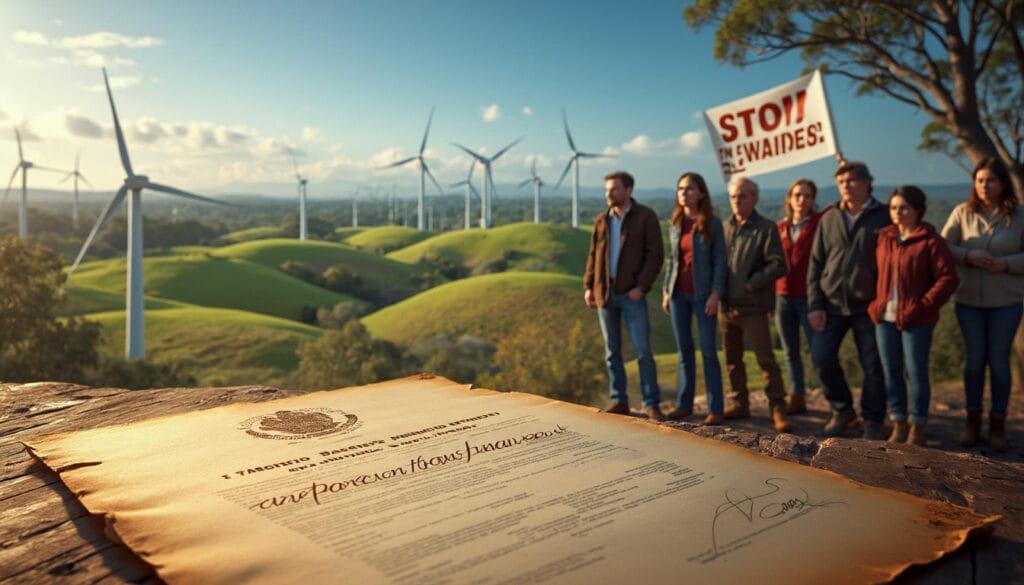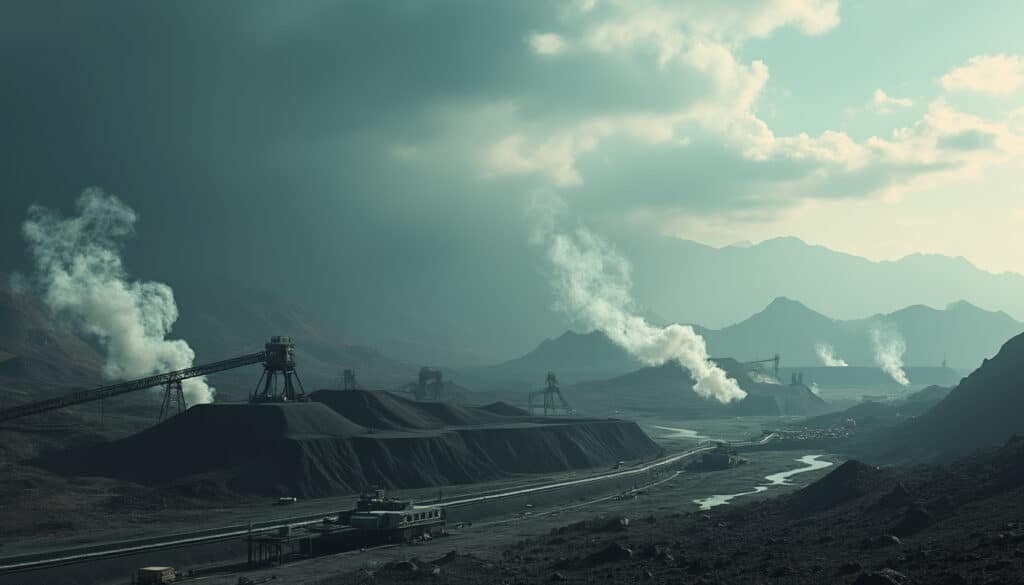The Barossa project by Santos has just received federal approval, causing shockwaves in the environmental community. With a CO2 content of 18%, it represents one of the most polluting gas fields in Australia. Environmental advocates are denouncing this decision as a major setback in the fight against climate change.
This development will allow for the extraction and transport of gas to Darwin, but it is estimated that it will add more than 270 million tonnes of greenhouse gases to the atmosphere. Despite concerns, Santos claims that the project complies with the Albanese government’s strengthened safeguard mechanisms. Critics, including the Australian Conservation Foundation, argue that environmental assessments are not rigorous enough. The scientific community and ecologists are calling for an urgent review of energy policies to avoid such high carbon impact projects.

santos obtains final approval for the barossa gas project
The Barossa gas project, located off the northern territory coast, has recently received the necessary federal approval to begin its production phase. This decision by the National Offshore Petroleum Safety and Environmental Management Authority (NOPSEMA) marks a crucial step for Santos, the Australian energy company, allowing it to extract gas and transport it to Darwin. However, this approval has not been without controversy, provoking strong reactions from environmental advocates who call it a true ” climate bomb ”.
what is the barossa gas project and why is it important?
The Barossa project is a significant offshore gas field discovered by Santos in the Barossa region. This gas field is distinguished by its carbon dioxide content of 18%, well above that observed in other Australian fields. NOPSEMA’s approval allows Santos to start gas production and build the necessary infrastructure to transport gas to international markets, including Darwin. The importance of this project lies not only in its capacity to provide a significant energy source but also in its potential economic impact for the region.
what are the environmental stakes of the barossa project?
The main environmental stake of the Barossa project lies in its potential contribution to greenhouse gas emissions. With a projection of over 270 million tonnes of CO2 emitted during the project’s lifespan, a large portion of these emissions will come from the combustion of exported gas. This amount of CO2 is considered a major threat to global efforts to combat climate change. Environmental advocates, such as Gavan McFadzean from the Australian Conservation Foundation, label this project a “ climate bomb ” due to its potential impact on rising global temperatures.
how does the australian government justify the approval?
The Australian government, through Santos, defends the approval of the Barossa project by highlighting its compliance with the strengthened safeguard mechanism of the Albanese government. According to Santos’ spokesperson, the project adheres to guidelines aimed at reducing or offsetting greenhouse gas emissions, aligned with the objectives of achieving carbon neutrality by 2050. Furthermore, the government emphasizes the economic benefits the project will bring, particularly in terms of job creation and stimulating the local economy. It is also noted that Barossa is expected to begin production in the third quarter of 2025, in line with budget and timeline projections.
what is the position of environmental advocates regarding this project?
Environmental advocates have reacted strongly to the approval of the Barossa project, labeling it a climate bomb. Gavan McFadzean from the Australian Conservation Foundation contends that this project should never have received the green light, pointing out that Barossa will produce more climate pollution than usable gas. Kirsty Howey, executive director of the Northern Territory Environmental Centre, laments the approval of this project in 2025, arguing that “climate science is clear: we cannot have new fossil fuel projects if we want to avoid dangerous global warming.” Advocates also believe that the safeguard mechanism is not functioning properly, as Santos has not demonstrated how the project would comply with environmental protection mechanisms.
what are the economic and energy implications of the project?
The Barossa project represents a significant economic opportunity for Australia, particularly for the Northern Territory region. The production of gas from this offshore site is expected to not only create direct jobs in the energy sector but also stimulate related economic activities, such as construction and transport. From an energy perspective, Barossa will help secure Australia’s natural gas supply, allowing the country to strengthen its position in the global energy market. However, these economic benefits are counterbalanced by environmental concerns, creating a complex debate between economic development and environmental protection.
what reactions has the approval of barossa sparked within the political sector?
The approval of the Barossa project has generated mixed reactions within the Australian political landscape. Environmental parties, notably the Greens, have expressed strong opposition, emphasizing the need to prioritize the energy transition and reduce greenhouse gas emissions. Sarah Hanson-Young, environmental spokesperson for the Greens, stated that if the Albanese government were re-elected, the Greens would be “essential” in ensuring concrete actions against projects like Barossa. Meanwhile, the Labor government defends its position by highlighting efforts to press down energy prices and progress towards a more sustainable energy system. They assert that technical decisions regarding offshore projects fall under the jurisdiction of the independent regulator NOPSEMA, thus emphasizing the separation of political decisions and independent regulation.
what future challenges does the barossa project and australian energy policy face?
The Barossa project faces several future challenges, both operationally and in terms of energy policies. Operationally, Santos will need to meet deadlines and budgets while ensuring a continuous reduction of greenhouse gas emissions in accordance with the requirements of the safeguard mechanism. In terms of energy policy, the approval of Barossa raises questions about Australia’s future direction in energy transition. Balancing the economic interests linked to the fossil fuel sectors and environmental imperatives represents a delicate equilibrium for the government. Additionally, pressures from environmental movements and potential changes in the Australian political landscape will reinforce the need for coherent and sustainable energy policies. The future of the Barossa project may also be influenced by developments in international gas markets and technological advancements aimed at reducing carbon emissions.
how are local stakeholders reacting to the barossa project?
Local stakeholders’ reactions to the Barossa project are varied and reflect tensions between economic development and environmental concerns. Local communities hope that the project will bring economic benefits, particularly through job creation and local infrastructure development. However, some voices are also rising to express concerns about potential environmental impacts, particularly on marine ecosystems and cultural sites of Indigenous peoples. Previous challenges, including legal challenges related to submerged cultural heritage, highlight the complexity of local issues. Moreover, community leaders stress the need for transparency and accountability from Santos to minimize negative impacts and maximize benefits for the region. Ongoing engagement with local stakeholders will be crucial for the success and sustainability of the Barossa project.
what are the future perspectives for renewable energies in australia in the face of projects like barossa?
The approval of the Barossa project comes at a critical time when Australia is at a crossroads regarding energy. On one side, there is a strong commitment to the development of renewable energies such as wind and solar, aiming to reduce the country’s carbon footprint and meet global climate change targets. On the other hand, projects like Barossa underscore the persistent dependence on fossil fuels and the associated challenges of a rapid energy transition. This creates a dynamic where renewable energies must not only become economically competitive but also demonstrate an ability to effectively and sustainably replace fossil sources. Investments in research and development, as well as policies favoring clean energy, will be crucial for Australia’s energy future. Furthermore, public debates and actions from environmental groups will continue to shape political and economic priorities, thereby influencing the direction the country will take in the years ahead.
Articles similaires
Thank you!
We will contact you soon.














